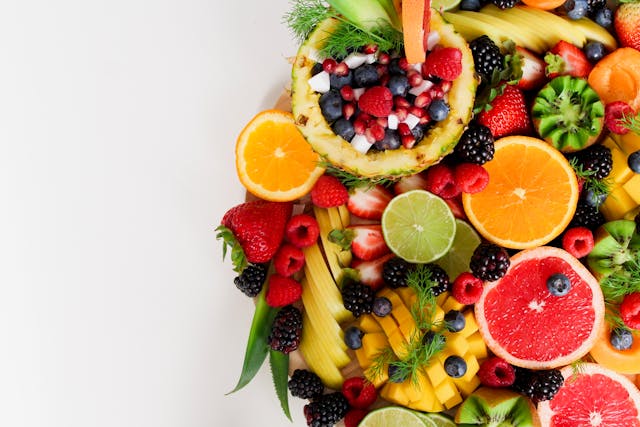Organic fruit has become a favorite choice for health-conscious individuals, offering a natural, chemical-free option packed with flavor and nutrients. From fresh produce to convenient snacks like dried fruit and fruit jerky, organic options provide a healthier alternative while supporting sustainable farming practices.
Read about Organic Pork here!
What Makes Organic Fruit Special?
Organic fruit is grown without synthetic pesticides, fertilizers, or genetically modified organisms. Instead, organic farming relies on natural methods like composting, crop rotation, and pest control to produce high-quality, environmentally friendly fruit.
Benefits of Organic Fruit
- Free from Harmful Chemicals: Organic fruits are grown without synthetic pesticides or herbicides, making them safer for consumption.
- Nutrient-Rich: Organic produce often has higher levels of certain vitamins, minerals, and antioxidants.
- Better Taste: Many people find that organic fruit has a fresher, more robust flavor compared to conventionally grown options.
- Environmentally Friendly: Organic farming promotes biodiversity, soil health, and water conservation, reducing the environmental impact.
Popular Organic Fruit Options
Organic Prunes
Organic prunes are a natural source of fiber and antioxidants. They are perfect for snacking, baking, or adding to your breakfast for a sweet, chewy texture. Unlike conventional prunes, organic ones are free from artificial preservatives, offering a cleaner and healthier choice.
Organic Strawberries
Juicy and sweet, organic strawberries are a delicious treat that’s perfect for eating fresh, blending into smoothies, or adding to desserts. They are grown without harmful pesticides, making them a safer option for your family.
Organic Dried Fruit
Organic dried fruit is a convenient, nutrient-dense snack. From dried apricots to mangoes and raisins, these fruits retain their natural sweetness and are free from added sugars and preservatives. They are ideal for on-the-go snacking or adding to trail mixes and baked goods.
Solely Fruit Jerky
Solely fruit jerky is a healthy, portable snack made from 100% organic fruit. With no added sugars or artificial ingredients, it’s a guilt-free way to satisfy sweet cravings. Available in various flavors like mango, pineapple, and banana, it’s a hit with both kids and adults.
Organic Orange Juice
Organic orange juice is a refreshing and nutritious beverage made from organically grown oranges. It’s free from synthetic additives and delivers a natural, zesty flavor packed with vitamin C. Look for cold-pressed options for maximum freshness and nutritional value.
Organic Fruits and Vegetables
A diet rich in organic fruits with vegetables provides essential nutrients that support overall health. These include vitamins, minerals, fiber, and antioxidants, which help boost immunity, improve digestion, and reduce the risk of chronic diseases.
How to Incorporate Organic Fruit into Your Diet
Adding organic fruit to your daily meals is easy and versatile:
- Breakfast: Top your oatmeal or yogurt with organic strawberries or dried fruit for a nutritious start to the day.
- Snacks: Enjoy organic prunes or solely fruit jerky as a convenient, energy-boosting snack.
- Juices and Smoothies: Blend organic orange juice with frozen fruits and leafy greens for a refreshing drink.
- Desserts: Use organic fruit as a natural sweetener in pies, cakes, and sorbets.
- Salads: Add sliced organic fruits like apples, berries, or oranges to salads for a burst of flavor.
Tips for Buying Organic Fruit
- Check Certifications: Look for USDA Organic or other reputable certifications to ensure quality.
- Shop Seasonally: Buy fruits that are in season for better taste and lower prices.
- Visit Local Farmers’ Markets: Support local organic farmers and enjoy fresher produce.
- Consider Frozen Options: Organic frozen fruits are a convenient and budget-friendly alternative that retains nutrients.
Storing Organic Fruit
Proper storage helps maintain the freshness and quality of organic fruit:
- Refrigeration: Store berries, grapes, and other perishable fruits in the refrigerator.
- Room Temperature: Keep bananas, oranges, and avocados on the counter until ripe.
- Freezing: Freeze excess fruit for later use in smoothies, baking, or cooking.
Why Choose Organic Fruit?
Choosing organic fruit isn’t just about better taste; it’s a commitment to your health and the environment. By opting for organic, you:
- Reduce your exposure to harmful chemicals.
- Support sustainable farming practices.
- Enjoy fresher, higher-quality produce.
Conclusion
Organic fruit offers a wholesome, flavorful, and eco-friendly alternative to conventionally grown options. From organic prunes and strawberries to convenient snacks like solely fruit jerky and organic orange juice, there’s a wide variety to explore. Whether fresh, dried, or juiced, organic fruits provide the nutrition and taste you need for a healthy lifestyle. Embrace the benefits of organic fruit today and enjoy the difference it makes for you and the planet.
